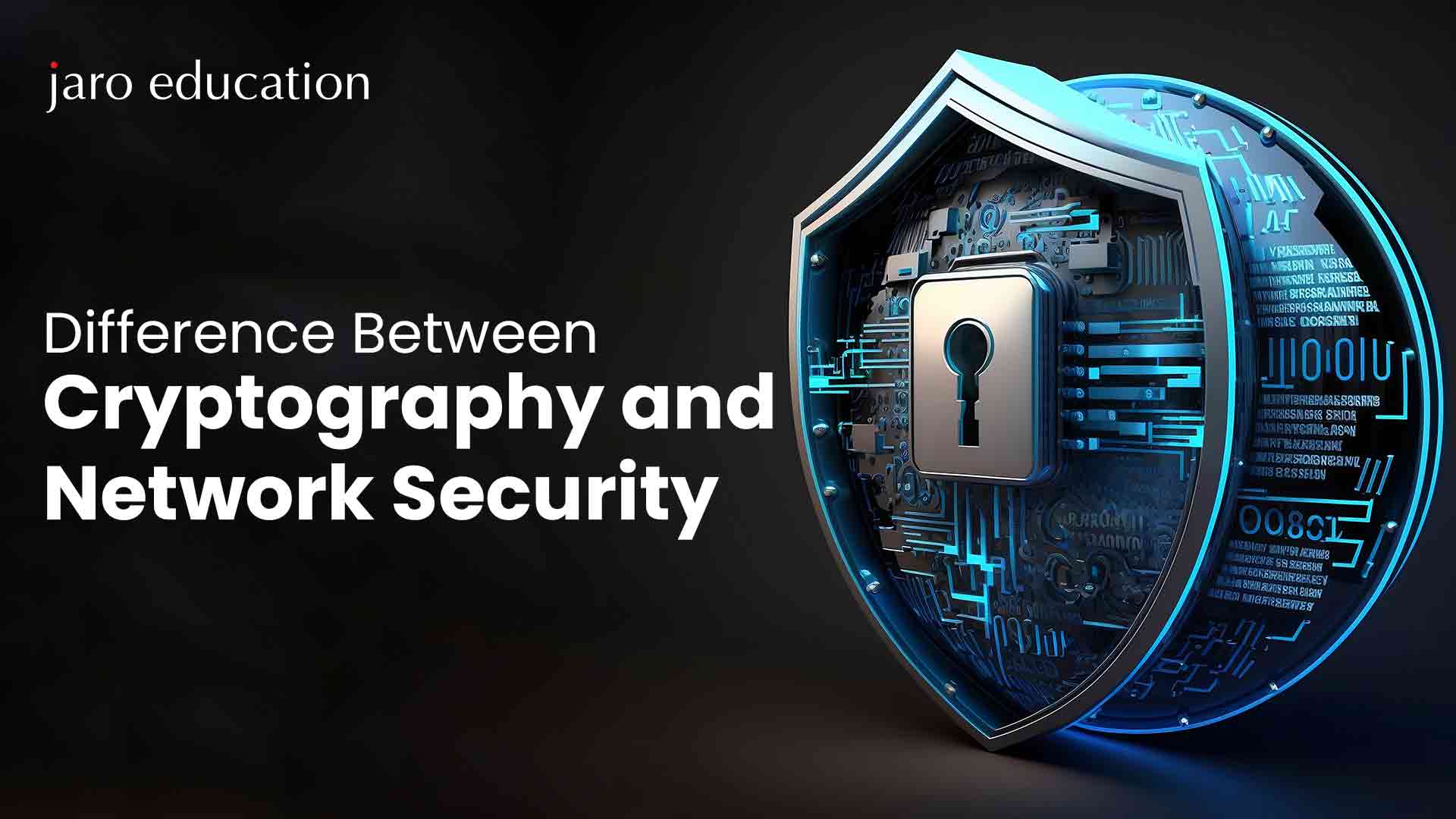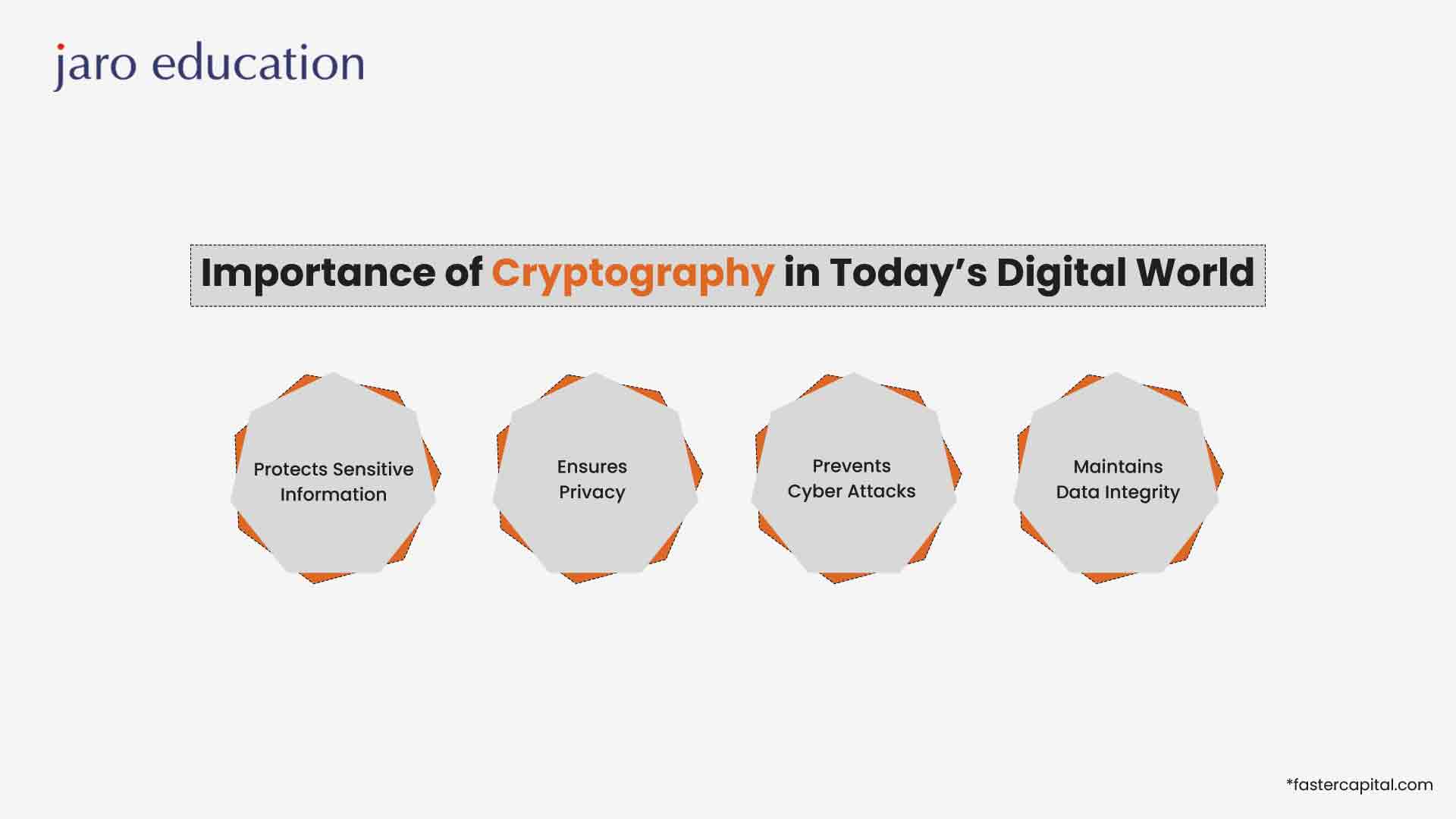Difference Between Cryptography and Network Security
Table of Contents

- jaro education
- 8, April 2024
- 10:00 am
In the contemporary security landscape, organizations prioritize the paramount objective of securing systems and protecting data from potential threats. Within the domain of cryptography, these threats manifest as passive and active attacks.
Distinguishing between cybersecurity and cryptography proves challenging for many, given their integral roles in addressing cybercrime. To establish clarity regarding these terms and their respective roles in technology, it becomes crucial to delve into each domain.
Cybersecurity involves a set of measures directed at safeguarding networks, applications, and devices from unauthorized access and malicious activities. On the flip side, cryptography entails the intricate process of encrypting and decrypting coded language, ensuring that only the intended sender and recipient can comprehend the information. Both cybersecurity and cryptography are pivotal in ensuring the security of sensitive user information, providing complementary layers of defense against cyber threats. While cybersecurity aims for overall protection against unauthorized access, cryptography specifically focuses on securing communication channels through advanced encoding techniques, contributing collectively to a robust cybersecurity framework.
What is Cryptography?
Cryptography, a specialized branch within computer science and information security, is a multifaceted field that employs mathematical and computational techniques to enhance the security of communication and data storage. At its core, cryptography aims to encode information to ensure that only authorized parties can access and comprehend it. This intricate process involves the use of cryptographic algorithms and sophisticated mathematical functions that systematically transform plaintext data into ciphertext.
The transformation into ciphertext renders the information unreadable to anyone lacking the corresponding decryption key, thereby ensuring confidentiality and integrity. This sophisticated layer of security is essential for protecting sensitive information and preventing unauthorized access or tampering during data transmission or storage. Cryptography plays a pivotal role in modern cybersecurity strategies, providing a robust foundation for safeguarding digital assets and maintaining the trustworthiness of communication channels in the ever-evolving landscape of information exchange.
For individuals interested in advancing their expertise in computer science, with a focus on emerging areas like cryptography and artificial intelligence, Master of Computer Applications (AI) Programme by Amrita Vishwa Vidyapeetham, offers an exceptional educational opportunity. This program provides students with a comprehensive understanding of the latest technological advancements, including AI and cybersecurity, preparing them for the challenges and opportunities of the future tech industry.
What is Network Security?
Network security constitutes a comprehensive domain that spans a multitude of strategies and measures meticulously designed to safeguard computer networks and data transmissions from a spectrum of potential threats, including unauthorized access, cyberattacks, and data breaches. This multifaceted field employs a combination of hardware and software solutions, coupled with the implementation of stringent policies and protocols, to guarantee the overarching goals of confidentiality, integrity, and availability within a network environment.
This expansive approach to network security extends its protective measures to encompass not only the physical hardware components of a network but also the intricate web of data flowing through it. By addressing vulnerabilities, mitigating risks, and fortifying defenses against malicious actors, network security serves as a crucial defense mechanism in the realm of information technology. It ensures that communication channels remain resilient, data remains confidential, and the overall network infrastructure operates with the utmost reliability in the face of evolving cybersecurity challenges.
Difference Between Cryptography & Network Security?
Under the cybersecurity field, cryptography and network security are integral components, each with distinct roles. The following table meticulously outlines the differences between Cryptography and Network Security, shedding light on their definitions, objectives, scopes, techniques, applications, roles in network security, relationships, and key contributions.
| Aspect | Cryptography | Network Security |
|---|---|---|
| Meaning | Involves the use of mathematical techniques to secure communication and data storage. Its primary focus is on encoding data to ensure confidentiality. | Encompasses a set of strategies and measures designed to protect computer networks and data transmission from unauthorized access, cyberattacks, and data breaches. |
| Objective | Aims to secure data through encryption and decryption processes, allowing only authorized parties to access and comprehend the information. | Aims to safeguard entire computer networks by preventing unauthorized access, and ensuring data confidentiality, integrity, and availability. |
| Scope | Primarily focuses on encoding data through cryptographic algorithms. Ensures that only intended recipients can understand the information. | Takes a comprehensive approach, covering both the physical and digital aspects of computer networks. It involves protecting network infrastructure, data, and communication channels. |
| Techniques | Involve the use of encryption and decryption algorithms to transform plaintext data into ciphertext. Utilizes cryptographic keys for secure communication. | Encompasses various techniques, including hardware and software solutions, policies, and protocols. Involves firewalls, intrusion detection systems, encryption, and access controls. |
| Applications | Ensure secure communication by securing the content of the data being transmitted. Applied in various contexts, including online transactions, communication channels, and data storage. | Protects the entire network infrastructure, including both hardware components and data transmission. Applied in securing networks against cyber threats, unauthorized access, and data breaches. |
| Role in Network Security | Serves as a fundamental tool or method within the broader framework of network security. Enhances data confidentiality and integrity. | Acts as a central and overarching discipline, providing a holistic defense against various cyber threats. Cryptography plays a crucial role in ensuring secure communication, protecting data, and preventing unauthorized access. |
| Relationship | Relationship | Encompasses various disciplines, with cryptography being one integral part of its arsenal. Network security relies on cryptographic techniques to achieve secure communication and data protection. |
| Key Contribution | Enhances data confidentiality and integrity during transmission. Critical for securing sensitive information and preventing unauthorized access to data in transit. | Safeguards networks against a wide range of cyber threats, providing a comprehensive defense mechanism. Network security ensures the overall protection of network infrastructure, data, and communication channels. |
Importance of Cryptography
Playing a pivotal role in contemporary society, cryptography establishes a secure foundation for communication, information storage, and digital transactions. Its significance spans various domains, encompassing technology, finance, government, and personal privacy. Several key reasons underscore the essential nature of cryptography:

- Confidentiality: Cryptography ensures the confidentiality of sensitive information by encoding it in a way that unauthorized individuals cannot understand. This is particularly important for protecting personal data, financial transactions, and classified information.
- Integrity: Cryptographic techniques help verify the integrity of data. Through methods like hashing and digital signatures, it becomes possible to detect any unauthorized changes or tampering with information. This is crucial for ensuring the reliability of digital communication and data storage.
- Authentication: Cryptography enables the authentication of users, devices, or entities in a digital environment. Through the use of digital signatures, certificates, and authentication protocols, it becomes possible to verify the identity of parties involved in a communication or transaction.
- Non-repudiation: Cryptography provides a means to establish non-repudiation, meaning that a sender cannot deny sending a message or a transaction. Digital signatures play a key role in ensuring that the originator of a message or document cannot later disown it.
- Secure Communication: In the context of secure communication over networks like the Internet, cryptography is essential to protect data as it traverses through potentially insecure channels. Secure protocols like SSL/TLS use cryptographic methods to encrypt data during transmission.
- E-commerce and Financial Transactions: Cryptography is fundamental to the security of online transactions, including online banking, e-commerce, and digital payments. Encryption and secure protocols ensure the confidentiality and integrity of financial data.
- National Security: Governments use cryptography to secure sensitive information related to national security. Military communications, intelligence data, and diplomatic correspondence often rely on advanced cryptographic techniques to protect classified information.
- Privacy: Cryptography is a cornerstone of digital privacy. It allows individuals to secure their personal communications, online activities, and stored data from unauthorized access. This is particularly important in an era of increasing digital connectivity.
- Blockchain and Cryptocurrencies: The security of transactions and the creation of new units in cryptocurrencies, such as Bitcoin, hinge on cryptographic techniques. The foundational technology of many cryptocurrencies, blockchain, employs cryptographic hashes and signatures to uphold the integrity and security of the distributed ledger.
- Cybersecurity: In cyber threats, cryptography assumes a pivotal role in bolstering cybersecurity. It serves as a crucial defense against unauthorized access, data breaches, and cyberattacks by implementing robust encryption and security protocols.
Importance of Network Security
Network security is of paramount importance in today’s interconnected world, where information is constantly transmitted and accessed through computer networks. The significance of network security can be understood from various perspectives, including protecting sensitive data, maintaining the integrity of systems, ensuring the availability of services, and safeguarding against a variety of cyber threats. Here are key reasons why network security is crucial:
- Confidentiality: Network security helps maintain the confidentiality of sensitive information by preventing unauthorized access. This is particularly important for protecting personal data, financial information, and proprietary business data from being accessed by malicious entities.
- Integrity: Network security measures ensure the integrity of data transmitted over networks. By implementing techniques like data encryption and integrity checks, organizations can detect and prevent unauthorized alterations to information.
- Availability: Network security plays a crucial role in ensuring the availability of network resources and services. Protection against denial-of-service (DoS) attacks, malware, and other threats helps prevent disruptions that could impact the availability of critical systems.
- Data Protection and Privacy Compliance: In many jurisdictions, there are strict regulations governing the protection of personal and sensitive data. Network security measures help organizations comply with these regulations, avoiding legal consequences and reputational damage.
- Prevention of Unauthorized Access: Network security mechanisms such as firewalls, intrusion detection systems (IDS), and access controls prevent unauthorized users from gaining access to sensitive systems and information. This helps thwart various cyber threats, including hacking and unauthorized access.
- Protection Against Malware and Viruses: Network security solutions are crucial in detecting and preventing the spread of malware, viruses, and other malicious software. This is essential for safeguarding the integrity of systems and preventing unauthorized access to sensitive information.
- Business Continuity: Effective network security measures contribute to business continuity by minimizing the impact of security incidents. In the event of a cyberattack or security breach, a well-implemented network security strategy can help organizations recover quickly and resume normal operations.
- Secure Communication: Network security protocols such as Secure Sockets Layer (SSL) and Transport Layer Security (TLS) enable secure communication over networks, protecting data in transit from eavesdropping and unauthorized interception.
- Protection Against Advanced Persistent Threats (APTs): Network security helps defend against sophisticated and targeted cyber threats, such as APTs. These threats often involve prolonged and stealthy attacks aimed at infiltrating networks and extracting valuable information.
- Corporate Reputation: A security breach can have severe consequences for an organization’s reputation. Network security helps maintain the trust of customers, partners, and stakeholders by demonstrating a commitment to protecting sensitive information.
Conclusion
This blog underscores the interdependence of cryptography and network security as foundational elements in the digital defense framework. Avoiding repetition, it’s evident that the collaboration between these two aspects is essential for contemporary cybersecurity. Together, they establish a multifaceted defense mechanism crucial for safeguarding digital landscapes. Harnessing the encryption prowess of cryptography and the comprehensive protective strategies of network security, organizations are more adept at confronting today’s diverse cyber threats. This integrated approach is indispensable for upholding the resilience and integrity of digital infrastructures and protecting communication and data from unauthorized access and cyberattacks.
In an era where cyber threats are becoming increasingly sophisticated, acquiring advanced knowledge and skills in these areas is paramount. The Master of Computer Applications (AI) Programme offered by Amrita Vishwa Vidyapeetham is designed to equip students with cutting-edge expertise in artificial intelligence, cryptography, and network security. This program not only deepens theoretical understanding but also enhances practical skills, preparing individuals to fortify digital landscapes and innovate in the field of cybersecurity.








